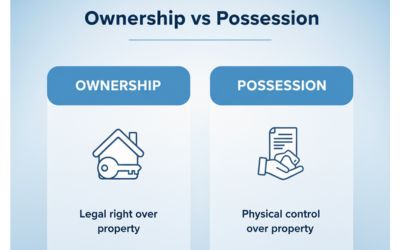Vasanthi v. Venugopal
(2017) 4 SCC 723 — Easy English case explainer for students

Quick Summary
The plaintiff bought the house in 1982 through a registered sale deed. The defendant was already living there. He claimed protection under Section 53-A of the Transfer of Property Act (part performance) based on an earlier agreement to sell with the original owner. Lower courts protected his possession. The Supreme Court checked the record and found no clear proof that the defendant (and later his heirs) were always ready and willing to complete the sale. The Court held that the legal requirements of Section 53-A were not satisfied and decreed the suit in favour of the plaintiff.
Issues
- Can the original defendant claim protection under Section 53-A TPA?
- Is the plaintiff the lawful title-holder to the suit property?
Rules
- Section 53-A TPA (Part Performance): Works as a shield to protect possession when there is a written contract for consideration, acts in furtherance/possession, and continuous readiness and willingness to perform.
- Specific Performance: Not filing or pursuing specific performance, and failing to show readiness/willingness, weakens a Section 53-A defence.
- Title: A registered sale deed supported by municipal mutation is strong evidence of title unless displaced by stronger legal proof.
Facts — Timeline

Arguments
Appellant: Vasanthi (Plaintiff)
- Holds registered title; mutation supports ownership.
- Defendant’s story of agreement/part performance is unproven.
- No continuous readiness and willingness from defendant/heirs.
- Section 53-A cannot defeat her clear title and possession claim.
Respondent: Venugopal (through heirs)
- Relies on earlier agreement to sell with the original owner.
- Claims to have paid ₹26,000 and stayed in possession.
- Seeks protection of possession under Section 53-A TPA.
Judgment

Held: The Supreme Court found that the record did not clearly prove that the defendant, during his lifetime, and later his heirs, were always and ever ready and willing to perform the agreement. The legal conditions for Section 53-A were not met. The Court set aside the contrary findings, rejected the 53-A defence, and decreed the plaintiff’s suit for declaration and possession.
Ratio
Section 53-A requires strict proof: a written contract for consideration, possession/acts in furtherance, and consistent readiness and willingness. Without these, the defence fails. Mutation-backed registered title of the purchaser will stand.
Why It Matters
- Clarifies that 53-A is a defence, not a way to claim title.
- Shows the importance of proving “readiness and willingness.”
- Warns buyers: pursue specific performance and keep evidence.
Key Takeaways
- 53-A = Shield only: It protects possession; it does not create title.
- Prove readiness: Continuous readiness/willingness is essential.
- Act timely: Not suing for specific performance can hurt the defence.
- Registered deed prevails: Clear title stands if defence is weak.
Mnemonic + 3-Step Hook
Mnemonic: “Write–Possess–Be Ready.”
- Write: Written agreement for consideration.
- Possess: Possession/acts in furtherance.
- Be Ready: Always ready and willing to perform.
IRAC Outline
Issue: Can the defendant resist eviction by invoking Section 53-A TPA?
Rule: 53-A protects possession if there is a written contract, consideration, possession/acts in furtherance, and continuous readiness/willingness.
Application: The record did not prove continuous readiness/willingness or proper part performance by the defendant/heirs. No specific performance action was pursued.
Conclusion: 53-A defence fails; plaintiff’s title and recovery claim succeed.
Glossary
- Part Performance (53-A)
- Defensive protection of possession under a written sale agreement when buyer acts on it and stays ready to perform.
- Readiness & Willingness
- Continuous intention and capacity to complete one’s part of the contract.
- Specific Performance
- A court order to actually perform the contract, often sought in sale of immovable property.
FAQs
Related Cases
Illustrations on Section 53-A
Judgments clarifying readiness & willingness and the “shield not sword” principle.
Title vs Possession Disputes
Cases where registered deeds prevail over weak part-performance claims.
Share
Related Post
Tags
Archive
Popular & Recent Post





































































































































Comment
Nothing for now